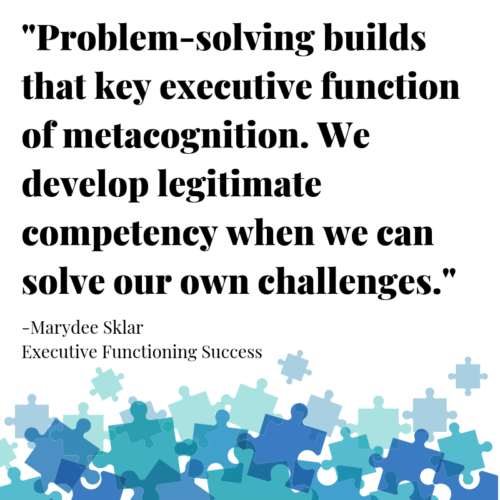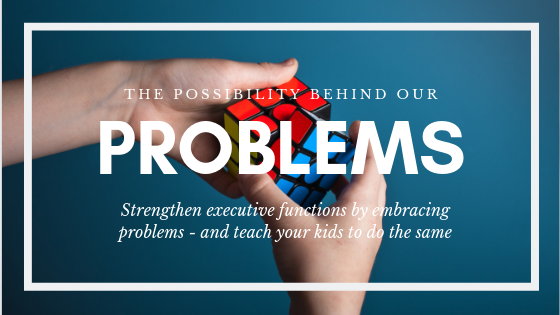I recently returned from the Learning Disabilities of America national conference, which has focused my thoughts on the executive function skill of metacognition or “thinking about your thinking”.
Specifically, I am considering the metacognitive process of problem-solving. At the conference, two very different presentations left me pondering our emotional brain’s response to the word “problem.” As we all know, it is a word that tends to elicit a negative reaction. We typically want to avoid anything that can cause us discomfort or distress.
A Lightbulb Moment
In a conference session on helping teens transition to adulthood, Ruth Hughes explained that it is important to teach our children to expect life to be a series of difficulties. This was a lightbulb moment for me.
 Though it sounds incredibly pessimistic and negative at first, this idea was actually brilliant. Because, in reality, every day presents a series of issues that require solving. Some are relatively simple. Others can be deep and complex. Some of us, like me, are in professions where people come for help with specific challenges. Without problems, I’d have no clients!
Though it sounds incredibly pessimistic and negative at first, this idea was actually brilliant. Because, in reality, every day presents a series of issues that require solving. Some are relatively simple. Others can be deep and complex. Some of us, like me, are in professions where people come for help with specific challenges. Without problems, I’d have no clients!
What we need to do is to reframe how we think about problems. Our brains are actually stimulated when we are solving a new challenge. It feels wonderful when we come up with a solution! Problem-solving builds that key executive function of metacognition. We develop legitimate competency when we can solve our own challenges. We want our children to enter adulthood with the confidence that they have the knowledge, tools and support to be successful problem solvers. That requires us to teach our children and teens how to embrace difficulties, not to hide from them. Helping our kids to get past their fear to build competence is critical to their success in life.
No One is Too Young to Learn This Skill
At our last staff meeting, I mentioned the topic for this blog. Veronica shared that her 3-year old had just discovered the word via his Montessori teacher. He is so cute when he says in a serious voice, “Sounds like we have a problem. We need to solve it. Let’s make a plan.” Isn’t that awesome? At 3, he is learning not just the ability to use metacognition to look for solutions but also future thinking and planning skills! And he has a very positive attitude about dealing with his problems.
 Children are naturally born with this ability, but often lose it over time as they discover a negative connotation to the word “problem”, modeled in the world around them. Our role as parents and educators is to help children to remember the positive aspects of our obstacles. They help us to think about our thinking. They teach us grit. They allow us to feel good about our abilities.
Children are naturally born with this ability, but often lose it over time as they discover a negative connotation to the word “problem”, modeled in the world around them. Our role as parents and educators is to help children to remember the positive aspects of our obstacles. They help us to think about our thinking. They teach us grit. They allow us to feel good about our abilities.
This past week has been very interesting as I shift from focusing on the pain of “problems” and reframing them as an opportunity to build my brain’s metacognitive strength.
At the end of each day, I told my husband about the issues I had solved or was working on. It feels better than just crossing off a mindless task from my to-do list.
I now invite you to reframe your relationship with your problems. Think of them as health food for your brain. And then consider the implication of LDA keynote speaker Dr. Eric Tridas, who ended his presentation with these words: “The problem may not be your fault…but it is your problem.”
What problems have you solved today?
Little by little…
Marydee


Thank you Marydee! Words often carry hidden power because we often carry a skewed definition that stems from our family of origin. And we often have an emotional reaction to words that e may not be aware of. It’s been a long journey but I’m finally at a place where the word ‘problem’ is an invitation not a barrier…I appreciate your comments.
Deb, I agree that individual words can be loaded with emotional “baggage,” influencing our responses. Congratulations on reaching that place where a problem is an invitation and not a barrier. I like that description.Thank you!
What a great article. I also love how this connects to kiddos too. My 8 year old daughter struggles with anxiety and worries about problems often. I also recently had an a-ha moment when, instead of asking her to simply–stop worrying, I asked her to brainstorm ways to solve or help her problem. Thinking of problems as puzzles to solve and overcome or build from is such a healthy perspective. And brings us back to the idea of a calm brain centering a “worried” brain. Thank you Marydee as always!
Christina, kudos on changing your wording as you help your daughter learn to manage her anxiety. Great mom moment!